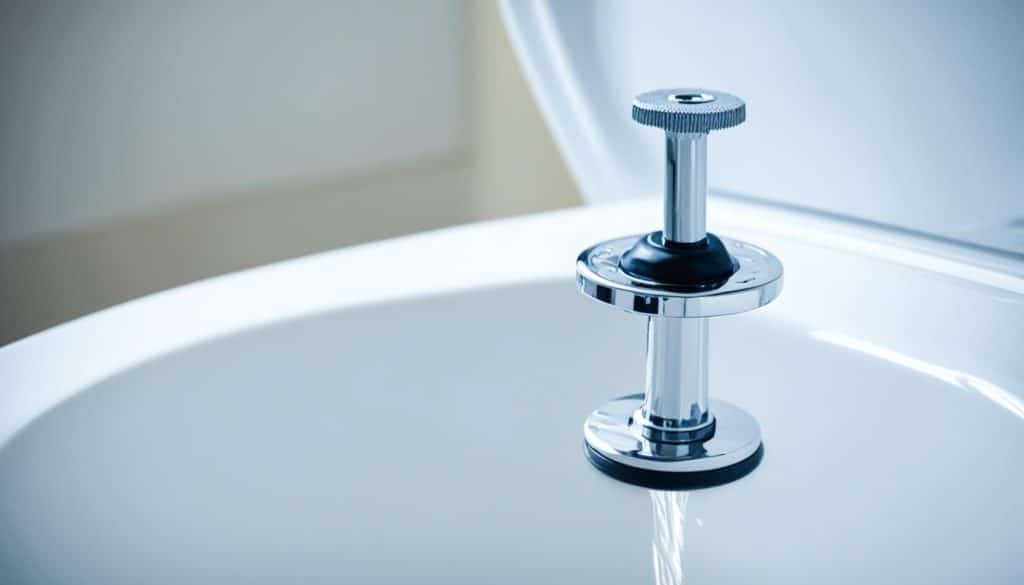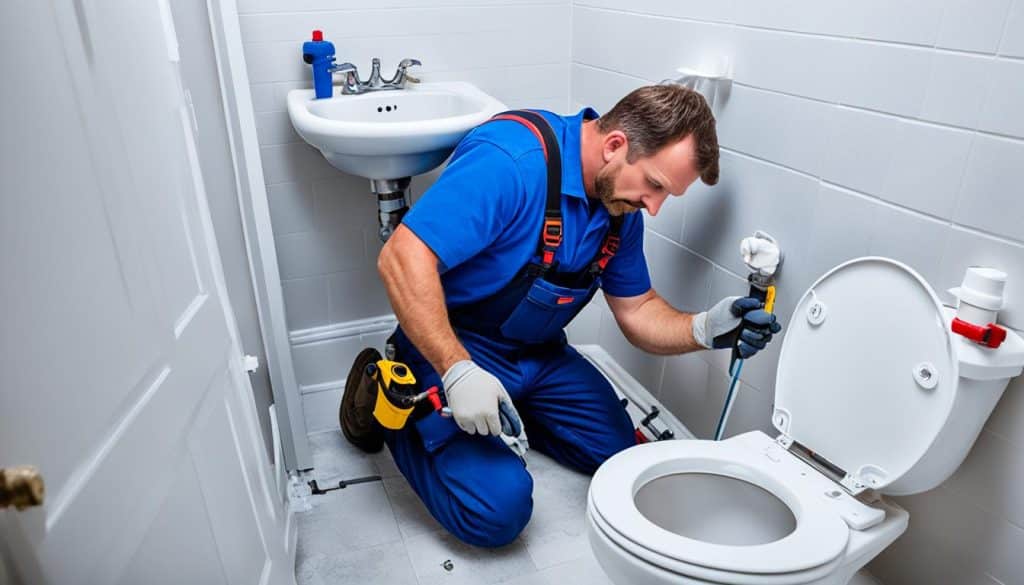Ever been startled by your toilet flushing by itself at night? Why Does my Toilet Flush on its Own (phantom flush)? This strange event, known as a self-flushing toilet issue or phantom flush, happens more often than you think. It usually comes from a hidden leak in the toilet tank. This leak causes the water level to drop, which then makes the toilet flush automatically.
Key Takeaways
- A toilet randomly flushing by itself can be due to an internal leak.
- The main culprit is usually a faulty toilet flapper or flush valve seal.
- A phantom flush can result in significant water waste and higher utility bills.
- Properly positioning the float and ensuring the fill valve is functioning can help resolve the issue.
- Addressing this problem promptly can prevent unnecessary inconveniences and costs.
Understanding Phantom Flushes: Causes and Symptoms
Phantom flushing, or a ghost flush toilet, can be confusing for homeowners. It’s often due to plumbing problems, not ghosts. Knowing the causes and symptoms is key to solving this issue.
What Is Phantom Flushing?
Phantom flushing is when your toilet flushes by itself due to plumbing issues. The main reason is a leak from the tank to the bowl. This leak lowers the water level in the tank, causing the toilet to flush unexpectedly.
This can waste a lot of water if not fixed quickly.
Common Symptoms of a Ghost Flush Toilet
Spotting the signs of a ghost flush toilet is important. You might hear a flush sound when no one is around. You could also see your water bill go up without explanation.
By catching these signs early, you can fix the problem. This saves water and prevents damage to your toilet.
Faulty Toilet Flapper Valve: The Main Culprit
The main cause of toilets flushing by themselves is often a bad toilet flapper valve. This valve seals the tank, stopping water from flowing into the bowl. If it gets damaged or clogged with minerals, it can’t seal properly. This leads to leaks and unwanted flushing.
Knowing how to check and replace the flapper valve is key to fixing this problem. It’s important to understand how to do this when your toilet keeps flushing on its own.

How to Inspect and Replace the Flapper Valve
First, turn off the water supply to avoid flooding. Open the tank lid and find the flapper at the bottom. Look for wear, damage, or warping on the rubber flapper.
If the flapper looks discolored or feels sticky, it’s time for a new one. To replace it, remove the old flapper from the chain and overflow tube. Then, attach a new one, making sure it fits well to prevent leaks.
Regular checks and timely replacements can stop phantom flushes. This is crucial when your toilet keeps flushing by itself.
Testing the Flapper Seal with Food Coloring
To check if your flapper seal is working, use food coloring. Add a few drops to the tank and wait 15-30 minutes without flushing. If the color shows up in the bowl, the seal is bad and needs to be replaced.
This simple test can help you figure out why your toilet is flushing on its own. It also helps keep your toilet working well over time.
Water Level Adjustments to Prevent Phantom Flushes
Water level in the toilet tank is key to stopping phantom flushes. The right water level stops unwanted flushes from seeping into the overflow pipe. It also prevents low-pressure flushes.
Water Level Adjustments – Ensuring the Correct Water Level
To adjust the water level, find the fill valve adjustment screw in the tank. Turn it until the water reaches the right level. This keeps your toilet working well and stops phantom flushes.
Keeping the water level right is important for your toilet’s performance. It helps avoid sudden problems.

Adjusting the Fill Valve for Phantom Flush Prevention
Homeowners need to check the fill valve’s work and water level. A bad fill valve can cause water level issues and automatic flushing. Fixing or replacing the fill valve helps stop phantom flushes and keeps your toilet working right.
Flapper Chain and Flush Lever Troubleshooting
Problems with flapper chain adjustments or flush lever issues can cause ghost flushing. An incorrectly set flapper chain stops the flapper from closing right. This leads to water constantly flowing into the bowl. It’s important to check that the flapper chain is attached correctly and has the right tension.
The flush lever is key to the toilet’s flushing system. It should go back to its starting position after use to save water. Checking and fixing the flush lever and the whole flushing system regularly can stop flushing problems from happening again.
If you’re still having trouble with the flush lever or flapper chain, getting help from a pro is a good idea. Companies like J Sewer & Drain Plumbing Inc. in Chicago, IL, offer expert help. They can fix these issues so you don’t have phantom flushes anymore and save water.
Conclusion
A toilet that flushes on its own is a common problem. It’s called phantom flushing. By checking the flapper valve, water level, flapper chain, and flush lever, you can find and fix the issue. Regular maintenance and quick action to problems help save water and money.
If DIY fixes don’t work, J Sewer & Drain Plumbing Inc. can help in Chicago, IL, and nearby. They offer a 5-year guarantee on sewer repairs and a 1-year guarantee for plumbing work. Their services and special deals make fixing plumbing problems easy and reliable.
Dealing with self-flushing toilets can be solved with the right steps and professional help. For top-notch plumbing services in Chicago IL and more, call J Sewer & Drain Plumbing Inc. at (773) 968-2704. Fixing phantom flushes makes your home more efficient and peaceful.


